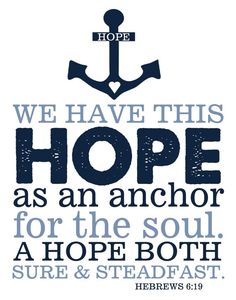When I asked my friends what books on this journey of hope are worth reading, one friend (Steve) suggested the book of Hebrews from the New Testament. At first it seemed an odd suggestion because Hebrews has always struck me as more of an argument for the divinity of Christ than a book about hope. But reflecting on the (admittedly few) passages from Hebrews I remembered, they all had an underlying message of hope and confidence. So I jumped in.

Several passages stood out. The most famous is at the end of chapter six as the author expounds on the unwavering certainty of God’s promise to bless us, “We have this hope as an anchor for the soul, firm and secure.” It’s an affirmation of God’s love for us. Which is the ultimate source of hope. This hope is the very foundation of our life in Christ.
There are also more subtle stories of hope, such as in chapter two when the reason for Christ’s death is explained. The passage says, “… by his death he might destroy him who holds the power of death — that is, the devil — and free those who all their lives were held in slavery by their fear of death.” Jesus destroyed the power of death over our lives. That has profound implications for how hope forms in our hearts and manifests itself in our lives.
Or look at chapter four, “Therefore … let us hold firmly to the faith we profess. For we do not have a high priest who is unable to sympathize with our weaknesses, but we have one who has been tempted in every way, just as we are — yet was without sin. Let us then approach the throne of grace with confidence, so that we may receive mercy and find grace to help us in our time of need.” Such confidence, an expression of hope, comes from the realization that God is merciful.
Perhaps the most obvious passage is 10:23, “Let us hold unswervingly to the hope we profess, for he who promised is faithful.” It’s curious how often hope is linked to perseverance. The next verse gives the obvious application of this hope through perseverance, “And let us consider how we may spur one another on toward love and good deeds.”
Then there is the insight, “Faith is being sure of what we hope for …” at the start of chapter eleven. What follows are brief outlines of many famously faithful people, each filled with hope for “…a better country.” Meaning, Heaven. But they didn’t get it, not in this lifetime, but rather lived by faith (which is being sure of what you hope for) right up until they died.
Hebrews is filled with hopeful imagery, encouraging truths, and exhortations to be confident. Reading it through the lens of hope, on a journey of hope, makes it come alive in new ways. Thanks, Steve, for the suggestion!

